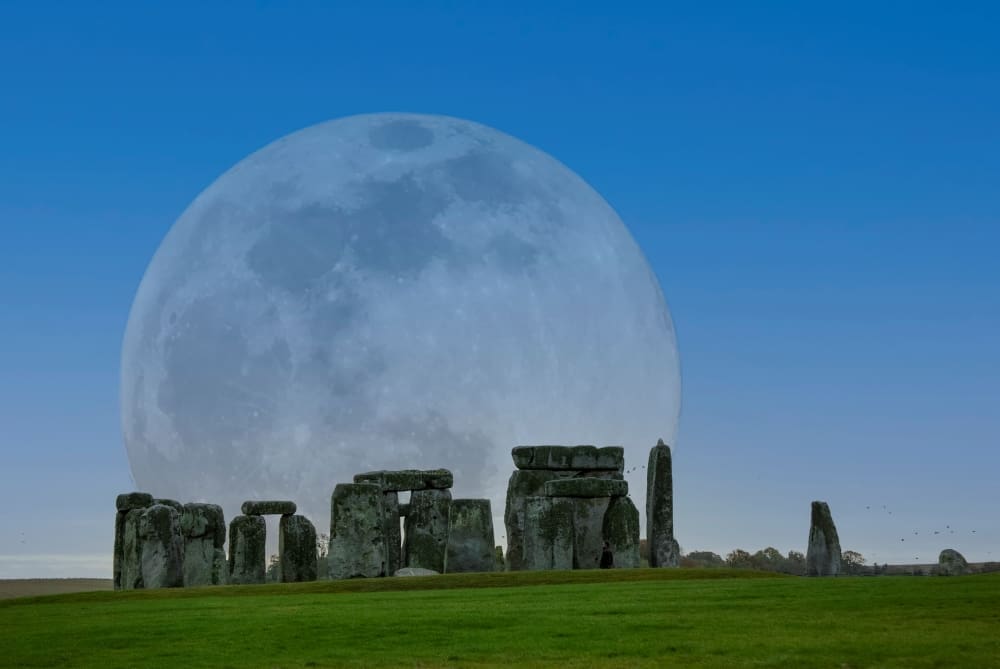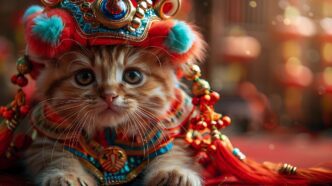In the celestial cabinet of Vedic Astrology, Ketu, the South Node of the Moon, operates as the ultimate spiritual catalyst and cosmic agent of detachment. It is not a physical planet but a mathematically calculated point—a shadow entity or Chhaya Graha—representing where the Moon’s orbit intersects the Earth’s ecliptic path on its southern trajectory. As the headless tail of the cosmic serpent, Ketu’s core mission is to sever our attachments to the material world, pushing us toward introspection, liberation (Moksha), and the fulfillment of our past-life karma. Its influence manifests as sudden, often inexplicable events, intuitive flashes, and a profound sense of having “been there, done that,” guiding the soul away from worldly ambition and toward its ultimate spiritual purpose.
Understanding Ketu begins with its powerful origin story. In Hindu mythology, the divine nectar of immortality was being distributed to the gods. An asura (demon) named Svarbhanu, disguised as a god, managed to drink a drop. The Sun and Moon gods spotted the deception and alerted Lord Vishnu, who swiftly decapitated the asura with his Sudarshana Chakra. Because the nectar had passed his throat, both parts of the demon became immortal. The head became Rahu, the North Node, forever chasing the Sun and Moon with an insatiable hunger he can never quell. The headless torso became Ketu, the South Node, left with no head to desire, see, or consume the world, embodying detachment, intuition, and the wisdom of past experiences.
The Dual Nature of a Shadow Planet
Unlike planets with physical mass and light, Rahu and Ketu are points of karmic influence. They function as an axis in the birth chart, always positioned 180 degrees opposite each other. While Rahu represents our future karma, obsession, and the material desires we must confront in this lifetime, Ketu represents our past karma, the skills we have already mastered, and the areas of life from which we must now detach.
Ketu is fundamentally a force of subtraction. Where it is placed in your birth chart, it tends to create a vacuum, a sense of dissatisfaction or a feeling of emptiness. This isn’t meant to be a punishment; rather, it’s a spiritual mechanism designed to prevent you from finding ultimate fulfillment in that area, thereby forcing you to look inward for a more profound and lasting peace.
Core Significations of Ketu
To grasp Ketu’s influence, it’s essential to understand its primary domains:
Spirituality and Liberation (Moksha): Ketu is the primary significator, or karaka, for Moksha. Its entire purpose is to untether the soul from the cycle of rebirth. A strong Ketu in a chart can indicate a natural inclination toward spiritual pursuits, meditation, and asceticism.
Past-Life Talents: The house and sign where Ketu resides point to skills and wisdom perfected in previous incarnations. An individual may have an innate, almost unconscious, talent in these areas but may also feel a strange apathy or lack of desire to pursue them further, as the soul has already exhausted its interest there.
Detachment and Loss: As the headless body, Ketu has no worldly desires. Its transit or dasha (planetary period) can bring about sudden separations or losses, compelling an individual to let go of people, possessions, or ambitions they are clinging to too tightly.
Intuition and Psychic Insight: Without a head to rationalize, Ketu operates on pure instinct and psychic energy. It governs deep intuition, spiritual visions, and a connection to unseen realms. People with a prominent Ketu often have a powerful “gut feeling” they learn to trust implicitly.
Ketu’s Influence Through the 12 Houses
The placement of Ketu in one of the twelve houses (bhavas) of the natal chart reveals the specific area of life where its themes of detachment, past-life mastery, and spiritual lessons will play out most prominently.
Ketu in the 1st House
When Ketu is in the ascendant, it directly influences one’s personality and self-image. These individuals may feel a sense of detachment from their own identity, leading to an identity crisis or a lifelong spiritual search. They often possess a mysterious aura and may have unusual physical characteristics or a disregard for their appearance.
Ketu in the 2nd House
The 2nd house governs family, finances, and speech. Ketu here can create a detachment from material wealth and family lineage. The person may struggle to accumulate money or feel dissatisfied by it, and their speech can be abrupt, mystical, or difficult for others to understand.
Ketu in the 3rd House
With Ketu in the house of courage, communication, and siblings, there can be a lack of connection with brothers, sisters, or neighbors. These natives often possess a headless courage, acting without thinking, and may experience breaks in their formal education or communication challenges.
Ketu in the 4th House
The 4th house represents the mother, home, and emotional happiness (sukha). Ketu’s presence here can indicate a spiritual or physical separation from the mother or homeland. The individual may feel a fundamental lack of inner peace and find it difficult to feel “at home” anywhere.
Ketu in the 5th House
This house rules creativity, romance, children, and speculation. Ketu here suggests a past-life mastery of these domains, leading to a current-life disinterest. It can cause detachment from one’s children, a lack of interest in romantic affairs, or creative blocks.
Ketu in the 6th House
In the house of enemies, debts, and diseases, Ketu can be surprisingly potent. It provides an innate ability to overcome obstacles and enemies in a sudden, unexpected manner. However, it can also manifest as mysterious, hard-to-diagnose health issues.
Ketu in the 7th House
The 7th house governs marriage and partnerships. Ketu here creates detachment in relationships. The native may attract spiritual, eccentric, or detached partners, or they may feel a profound sense of dissatisfaction within the partnership, pushing them to seek fulfillment internally rather than through another person.
Ketu in the 8th House
This is a powerful placement, as the 8th house rules mysteries, occult, transformation, and joint finances. Ketu thrives here, granting a deep, intuitive interest in astrology, metaphysics, and research. It can also signify sudden inheritances or, conversely, sudden financial losses through a partner.
Ketu in the 9th House
The 9th house relates to the father, gurus, higher learning, and philosophy. Ketu here can create unconventional or critical views of traditional religion and authority figures. The individual may question their father or teachers and forge their own unique spiritual path.
Ketu in the 10th House
In the house of career and public status, Ketu can bring sudden and dramatic shifts. The native may experience a rapid rise to a high position followed by an equally sudden fall, or they may feel a constant dissatisfaction with their professional life, no matter how successful they become.
Ketu in the 11th House
The 11th house governs friendships, social networks, and gains. Ketu here can lead to a small social circle or a feeling of being an outsider. Gains may come from unusual sources, but the individual often feels detached from their friends and societal ambitions.
Ketu in the 12th House
This is considered the most natural and potent placement for Ketu, as the 12th house is the house of enlightenment, isolation, and endings. Here, Ketu is in its element, powerfully supporting meditation, spiritual practices, and the ultimate goal of Moksha. It signifies a soul in its final stages of the karmic cycle.
Navigating a Ketu Period (Dasha)
When one enters a Ketu major period (Mahadasha), which lasts for seven years, its themes come to the forefront of life. This is often a time of intense introspection, confusion, and re-evaluation. Events can feel fated and out of one’s control, as Ketu works to dismantle the ego and dissolve attachments that are holding the soul back.
During this time, worldly ambitions may seem pointless, and relationships or careers that are not aligned with one’s deeper spiritual path may suddenly dissolve. While potentially disorienting, the Ketu dasha is a profound opportunity for spiritual growth, forcing a realignment with one’s true self.
Practical Remedies for a Challenging Ketu
When Ketu’s influence feels disruptive or negative, Vedic astrology offers remedies to harmonize its energy. These are not quick fixes but practices that align one with Ketu’s higher spiritual purpose.
- Worship of Lord Ganesha: Lord Ganesha is the presiding deity of Ketu. Regularly chanting his mantras or offering prayers can help overcome obstacles and channel Ketu’s energy constructively.
- Spiritual Practices: Meditation, yoga, and self-inquiry are the best remedies for Ketu. These practices help quiet the mind and connect with the intuitive wisdom Ketu offers.
- Charity: Donating to spiritual or humanitarian causes, especially on Tuesdays or Saturdays, is highly recommended. Feeding stray dogs is also considered a powerful remedy for Ketu.
- Embracing Minimalism: Since Ketu’s goal is detachment, voluntarily simplifying one’s life, decluttering possessions, and practicing non-attachment can appease its energy.
- Gemstone Therapy: The gemstone for Ketu is Cat’s Eye (Lehsunia). However, this is a powerful stone that should only be worn after a thorough consultation with an experienced astrologer, as it can amplify Ketu’s effects, for better or worse.
In conclusion, Ketu is far more than a malefic point of loss in the cosmos. It is the great spiritual purifier, the force that reminds us that our true identity is not found in our possessions, relationships, or achievements. It is the headless sage that teaches us to see without eyes, to know without a mind, and to find fulfillment not in acquiring more, but in letting go. By understanding and embracing its lessons, we can navigate its challenges and align with its ultimate gift: the profound and liberating peace of spiritual freedom.








